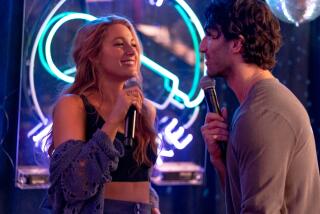Not Just for Kids book review: ‘The Future of Us’
The Future of Us
A Novel
Jay Asher and Carolyn Mackler
Razorbill: 359 pp., $18.99, ages 14 and up
With the exception of the psychically inclined, most people would prefer to let their futures remain unknown, fearing that what they discover might influence their current choices and, as a result, alter what was otherwise meant to be.
In the inventive new young adult novel, “The Future of Us,” two Pennsylvania teenagers aren’t given that choice.
Emma Nelson was a middle-of-the-road 16-year-old, running track and practicing saxophone at Lake Forest High when her divorcee dad gave her a guilt gift — a hand-me-down computer. The year was 1996, when PCs were as bulky as televisions and the Internet was accessed with dial-up service.
Facebook is still years away, yet the social networking site popped up on Emma’s computer screen after she downloaded an AOL CD-ROM that promised to give her 100 hours of free Web access. Emma Nelson, the site said, was 31 years old. And she was married. Though the elder Nelson shared the same birthday and liked the same movies and comfort foods, Emma was taken aback by this other Emma Nelson, who was contemplating highlighting her hair and wondering why her husband hadn’t come home over the weekend, according to her status updates.
“Why would anyone say these things about themselves on the Internet?” Emma wondered, before dismissing Facebook as a prank. But when she called over the next-door neighbor, who had given her the CD-ROM, to accuse him of somehow manipulating it, he denied any wrongdoing. He too had a future he’d never known about on Facebook. He was married to the hottest girl in school.
So begin the adventures of Emma and Josh — neighbors, former best friends and, at least as far as Josh’s interest in Emma is concerned, unrequited love interests. Both are affected by the abundance of private information on Facebook in this retro, parallel-universe thriller that explores the power of personal choice and the importance of real-world connections in a society increasingly influenced by technology.
“The Future of Us” is a novel for young adults, but it might be even more appealing to Gen X readers, who’ll experience it as a nostalgic walk down memory lane. In 1996, when the action takes place, caller ID had just been invented, prom night involved dancing the Macarena, the Dave Matthews Band played regularly on FM radio, Cindy Crawford was the boys’ bedroom poster of preference and athletes strapped Sony Discmans to their arms to go running.
The story is cowritten by Jay Asher and Carolyn Mackler who, together, are a sort of literary super-duo. Asher is the author of the 2007 anti-bullying tale, “Thirteen Reasons Why,” which spent 65 weeks on the New York Times hardcover bestseller list. Mackler is the writer of the 2005 Printz-Honor-winning novel, “The Earth, My Butt, and Other Big Round Things,” about family expectations.
Both novels’ themes are present in some form here, as Emma and Josh try to make sense of their futures in present-day 2011 and the choices they’re making in high school that set those futures in motion.
There’s a Dickensian aspect to “The Future of Us.” More specifically, the story unfolds in a manner similar to “A Christmas Carol,” in which the main characters are shown glimpses of their future that affect their present-day actions.
For Josh, knowing his future life with the curvaceous blond, Sydney Mills, is positive, emboldening him to talk to the school’s most popular and attractive girls. Emma, on the other hand, sees only unhappiness and actively seeks to alter any interactions that might lead to an adulterous or otherwise loveless marriage.
The results of their behavior are instantly measurable on Facebook, in which Emma’s and Josh’s future families, careers and residences are affected by the ripples of change they set in motion even with the most mundane of actions, such as fighting with each other or making a casual comment.
It’s a compelling plot device, and a powerful message — that actions have consequences, so act wisely.
More to Read
The biggest entertainment stories
Get our big stories about Hollywood, film, television, music, arts, culture and more right in your inbox as soon as they publish.
You may occasionally receive promotional content from the Los Angeles Times.










